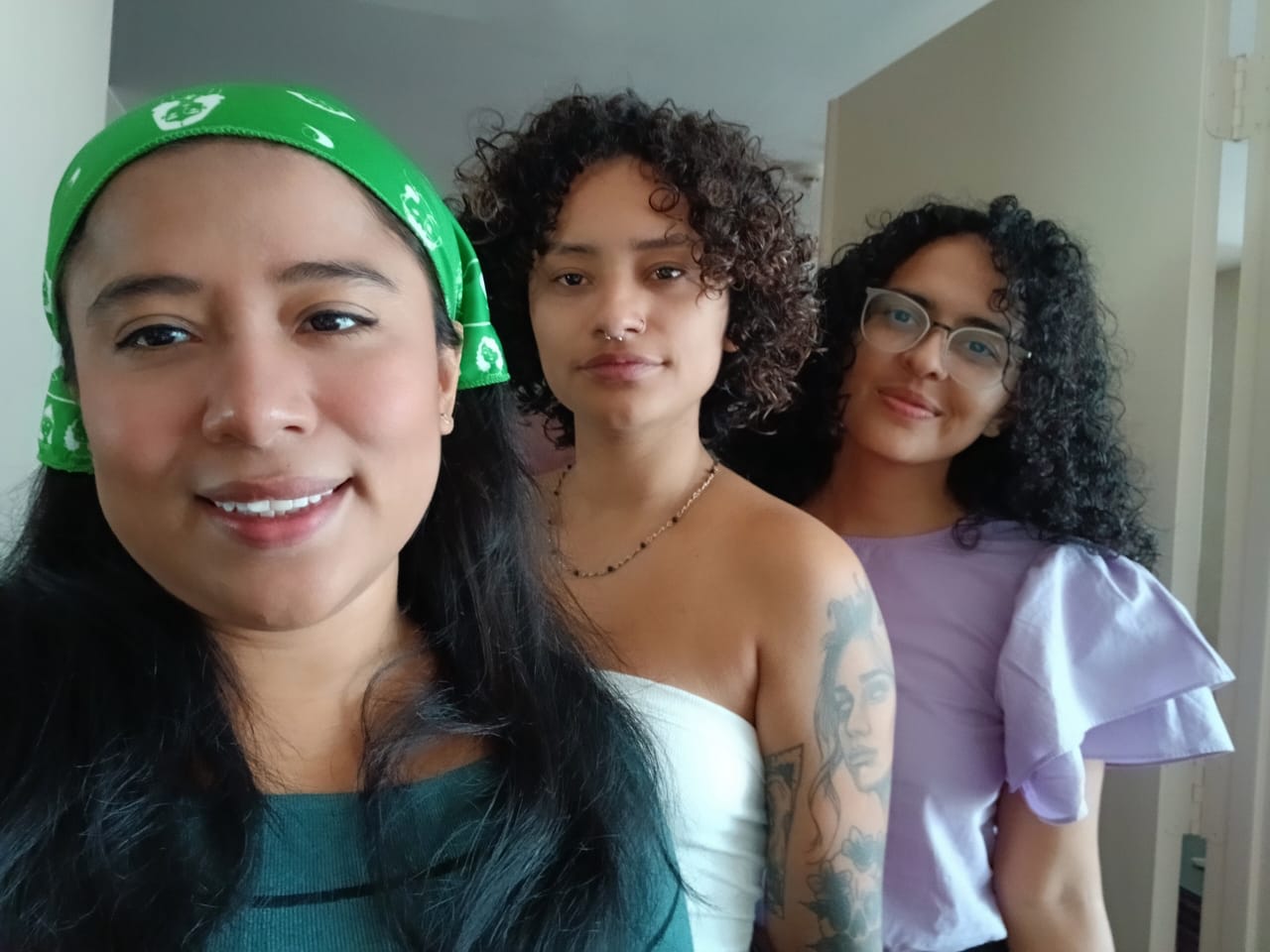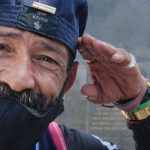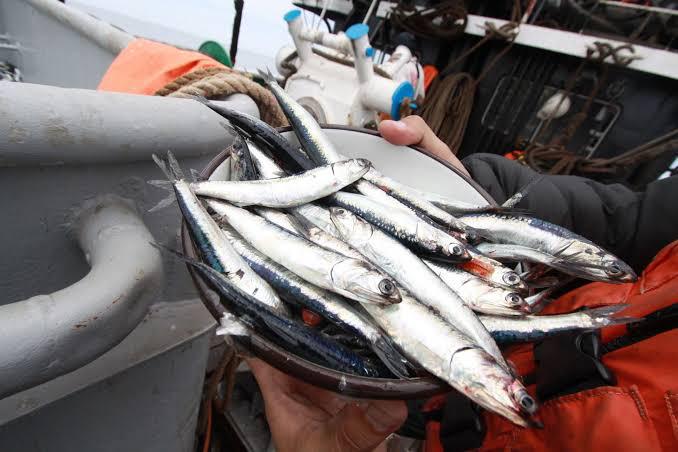The young Nicaraguan activists and feminists Adela Espinoza, Gabriela Morales and Mayela Campos, released from prison and exiled on September 5 on a plane directly to Guatemala, along with 132 other political prisoners, are an example of the persecution and torture that the dictatorship in Nicaragua applies against those who dare to protest.
The three were arrested in August 2023. They were tried and sentenced to eight years in prison after burning the flag of the Sandinista National Liberation Front (FSLN), an action they did in protest against the closure and robbery perpetrated by the Ortega regime against the facilities of the Central American University (UCA).
Adela, Gabriela and Mayela not only shared the act of protest, but also the cells and criminalization imposed on them by the Nicaraguan regime. On August 22, 2023, after several days of torture in Police District Three in Managua, they were taken, with shackles pressing their hands and feet, before a judge in the Judicial Complex of the capital. They were accused of at least seven crimes, including: terrorism, undermining national integrity, cybercrimes, disturbing public order and damaging national property.
Related news: Confiscation of the UCA is a “swipe” by the dictatorship against free thought and quality higher education
«Three months later they sentenced us. Each of us was sentenced to eight years in prison. They lied to the point of saying that they caught us with 3 and 2 kilos of drugs, that they arrested us together in a taxi, that the driver ran away, when in reality they arrested each of us separately in our homes, and of course without any drugs. They arrested us for burning the flag of the Front,» Mayela said in an interview with Article 66.
Tortures in District Three
Adela Espinoza, 27, a social communicator and mother of two children aged 10 and 8, was the first of the group to be arrested on August 19, 2023. It was a Saturday and, she stressed, fortunately her children were at their paternal grandmother’s house and did not witness her arrest. The young activist was with two friends, her sister and two underage nephews at her home, located in a Managua neighborhood.
Before the arrest, a man came to ask for Adela at her house. The man pretended to be an Invercasa worker, but gave a surname that did not correspond to that of the now released and politically exiled woman, so he was sent away from the place. “Five minutes after he left, and I was already in the bathroom in shock, I heard a radio playing outside my house, it was one of those used by the police, and from that moment I knew. They were coming for me. I quickly left the bathroom and as I was leaving they knocked down the door of the house. They were police officers with AKs, dressed in blue and black. I went out and shouted: “It’s me, it’s me,” and they took me out barefoot, in shorts and a T-shirt,” Espinoza told Article 66.
That same day, but in the afternoon and in another Managua neighborhood, the police also arrested Gabriela Morales, 27, a graduate in Social Work. At the time of the arrest, the young woman was with her mother, two sisters and three underage nephews.
Related news: Adela Espinoza’s family home raided, seized by Ortega police
“The police arrived in a violent and aggressive manner. They beat my sister, put the AK to her head, and when I heard my name from inside, I shouted that it was me. They grabbed me, took a photo of me outside my house, and put me in the patrol car,” said Morales.
Both were taken to District Three. Adela Espinoza, who arrived first at the police station, describes her time there as “terrible” because of the level of psychological torture and abuse she was subjected to. She recalls that from the moment she arrived, one of the chiefs ordered officers to take her “back” to “take away her spunk.”
“They pushed me to put on the blue uniform and it was very humiliating. They forced me to undress in front of the officers. They made me take off everything, even my underwear. I have several tattoos and piercings on my body. When I took off my shirt and they saw that I had piercings in my breasts, they said: “Look how far this one goes,” and they started judging me for wearing that and they told me to pull down my underwear to see if I had any piercings there (in my vulva) too,” Espinoza denounced.
Gabriela Morales was also forced to strip naked in front of female police officers. In her case, she was not tried because she had no piercings or tattoos on her body, but an officer threatened her that “common prisoners” were going to rape her. “In District Three, they kept me interrogated all day and night. They were violent, verbally and psychologically. I suffered a lot of psychological violence. One of the police officers put his gun on my shoulder to make me talk. The verbal and psychological violence was horrible. They also made me strip naked, do squats naked in front of the female officers, and I was sexually harassed by an officer. He told me that common prisoners were going to rape me and made disgusting gestures with his tongue,” recalled the former political prisoner, now free and from a hotel in Guatemala.
Surviving confinement in La Esperanza
Mayela Campos, 29, a fourth-year Industrial Engineering student, was arrested two days later, on August 21, 2023. The police first came to look for her at her father’s house, but then they also went to her partner’s home, located in a Managua neighborhood, where they found her and arrested her.
“Three patrol cars arrived and put me in the back of the van. They hit me in the chest because I turned around to see that they were also taking my husband away. They were beating him. They were in my house for a long time. They arrived at 3 in the afternoon and they didn’t take me to District Three until 6 in the afternoon, with my partner, who was released the next day,” Campo explained.
The young activist, like Gabriela and Adela, was psychologically tortured in District Three. On August 22, 2023, all three were transferred to the La Esperanza prison, located in Tipitapa, and locked up in solitary confinement. The isolated confinement of those first few weeks affected Mayela greatly.
Related news: Student leaders to face trial for cybercrime
She recalls that the staff “were very cruel, they made fun of us, they called us names, they refused us medical attention, and if they did give it, it was very bad. They never gave us a gynecological check-up and on one occasion, when they refused me care, because there were several, I had a gastritis crisis and I felt very ill, I had a fever, vomited and I fainted from the pain.”
Mayela Campos, after six months of confinement and torture in La Esperanza, says that at one point she made the decision to “hurt her body a lot.” She tried to end her life in a moment of extreme desperation and the officers acted by taking her out of her cell, handcuffing her hands and feet, and leaving her alone in another cell for several days, causing one of her hands to be injured.

The young woman remembers that she received poor psychological care, in which she was only told to connect with the walls and beds of the prison. Her family was not informed of her situation and she was not given an extraordinary visit that would allow her to feel the relief of being with her family.
Adela Espinoza also suffered isolation in La Esperanza. Her punishment cell was located in pavilion two and she describes it as “small and horrible.” For a whole month, the young woman was not able to speak to anyone; her bed was located in front of the bars where she was exposed to the sun from midday until four or five in the afternoon. She had vision problems for so long that she was directly exposed to the sun, she had skin sores and suffered panic attacks until she was sent to another cell with the other political prisoners.
Gabriela Morales, in La Esperanza, suffered threats and was labeled as “undisciplined.” She remembers being threatened with having her visits taken away for reading the Bible out loud or singing Christian, feminist or revolutionary songs by Carlos Mejía Godoy.
“They always threatened me that they would no longer give me visits or benefits, but they never silenced me. I always did what came from my heart and no matter how many reports or threats they made, I did not pay attention,” said Morales.
She says that in La Esperanza she saw many women suffer, including older women who were humiliated with pills or toilet paper, were denied medical attention and almost died from suffocation on their own saliva, since they had denied her an allergy medicine and her throat had become inflamed. “Until I told them that if I died it would be their fault, the doctor gave me a pill and I became less swollen,” she said.
Freedom and exile
On September 4, after completing one year and two weeks of confinement in La Esperanza, Adela, Gabriela and Mayela received the news that they were going to be released. Adela Espinoza remembers that they had just finished praying when they heard the gate of the pavilion open. They saw the deputy warden and the warden of the prison in the cell next door and then they entered theirs.
“It was around 7:00 or 7:30 at night. The warden told us: ‘Your time has come, this is your moment, go, change, take a shower and don’t make a fuss because otherwise you’ll be screwed,'” Espinoza recalled.
She says they were not allowed to take anything out of their cells, they were made to take off their uniforms and were given new clothes, some of the medicines they had and they were put on a bus. “On the bus I saw a woman who told me that she came from Granada, that she had been in prison for 27 months, and when I spoke to her I found out that we were going to be released. I felt very worried. I had been persecuted since 2018 and I had refused to leave. I thought about my children, my family, about when I would see them again,” said Adela.

Gabriela says that before receiving the news that they would be released, she sang “Sin miedo” (Without fear) by Vivir Quintana, in which they shouted: “Let the State, the heavens, the streets tremble. Let the judges and the judicial authorities fear. Today they take away our calm from women. They planted fear in us, we grew wings.” Upon hearing the news of their freedom, she says, she got on her knees “to thank God and I asked him for us all to go.”
“I suffered a lot when I didn’t see the other women. It was a very bittersweet situation and we will continue to raise our voices for all those women,” she insisted.
Adela Espinoza reveals —amid tears— that when she arrived at the plane that took them to Guatemala, she was “the last to get on, my feet were shaking, I stopped for a moment on the stairs of the plane, to say goodbye, to see my country for the last time.”
Once on the plane, Gabriela was overcome with tears for leaving her homeland, and she felt like singing the song “I will return to my homeland” and was accompanied by other political prisoners.
The three young women have decided to get back to their lives and get ahead, even if this means leaving their homeland due to the political banishment imposed on them, since if they return, they are threatened with imprisonment again. Some of them are still not sure which country they will seek refuge in. Adela is evaluating the best options to achieve family reunification with her children and mother. Gabriela is clear that she wants to continue studying and hopes to obtain refuge in the United States. Mayela is still evaluating this.















